Happy Birthday, chaplains.
The Army's Chief of Chaplains, Maj. Gen. Douglas Carver, and his regimental Sgt. Maj. Tommy Marrero, visited Fort Knox last week to celebrate the Chaplains Corps' 234th birthday.
The corps was organized just six weeks after the Continental Congress met in 1775 because Gen. George Washington saw the need for someone to accompany Soldiers into battle to ensure their freedom to exercise religious beliefs was protected.
Contrary to some who feel the mission of chaplains is strong-arming Soldiers to develop religious faith, Carver said the Army chaplains serve a pluralistic society. Soldiers representing more than 200 faith groups serve in the Army, with chaplains serving believers from Protestant, Roman Catholic, Buddhist, and Muslim backgrounds - to name a few.
"Just because you serve doesn't mean you hang up your faith at the door," Carver explained. "We are blessed as a nation that we can all equally share and show respect for our various cultural backgrounds and live without infringing on those rights. Our ministry is one of bringing God to Soldiers and Soldiers to God. We leave it up to God to determine how that takes place. We don't coerce any Soldier.
"More accurately, ours is a ministry of presence. We have Soldiers in 80 nations, and wherever there are boots on the ground, we have chaplains and assistants there that follow the core competencies of our branch: to nurture the living, care for the wounded, and honor the dead."
The chaplain assistants are celebrating as well, although their specialty is only 100 years old.
"Chaplain assistants set the conditions for worship for our Soldiers," Marrero said. "They help us ensure not only worship services, but provide for spiritual needs, assessments for counseling and referrals."
In the past, chaplain assistants functioned as little more than janitors, mopping chapel floors, counting offerings, and serving as drivers for chaplains. Marrero said that has changed.
"First and foremost, chaplain assistants are Soldiers," Marrero said. "They have been integrated into the ministry of chaplains, but they are operational Soldiers who carry weapons to ensure (that the) chaplain ministry happens, and chaplains are safe."
"Chaplains are non-combatants, per the Geneva Convention," Carver added. "Downrange in Iraq, (Marrero) went with me. My sergeant major carried a weapon to protect me. We often have split operations in the combat zones; chaplains accompany their commanders while the chaplain assistants stay at the chapel, keeping it operating on the chaplain's behalf."
"We have become very specialized in our (military occupational speciality)," Marrero said.
"Chaplain assistants live in the barracks with Soldiers," Carver said. "They have a unique role. A number of our Soldiers will talk to the chaplain assistant (because he is enlisted) before they will talk to a chaplain (because he is an officer). The assistant identifies with the rigors and challenges of being a Soldier.
"God only knows the number of Soldiers helped by chaplain assistants through their ability to listen and provide guidance. They provide a friendly ear, available late at night in the barracks or day rooms where chaplains may not be invited."
As spiritual caregivers, Carver explained that chaplains and chaplain assistants experience post traumatic stress disorder symptoms like any other Soldiers, but often have to deal with it differently.
"Often, we have to go from caring for one wounded or dying Soldier to another very quickly, and we don't always have time to grieve until we get home," Carver said.
"We want to make sure that the cup of our chaplains and chaplain assistants is not empty. We have set up a center in North Carolina for chaplains to maintain spiritual resilience, individual retreats, small group counseling - an opportunity to tell their sacred stories in a place that offers safety and allows them to experience redemptive strength. We're finding that's effective."
Another way to help chaplains and their assistants is to remind their endorsing agencies to reach out and ensure their chaplains are taken care of, given opportunities to recover and remain strong, Carver added.
The hardest job for chaplains, he said, is witnessing the trauma of war.
"War isn't pretty," he said. "People are always affected. I don't know of any Soldier who votes to go to war. The toughest part is to see kids who don't come back or those who come back physically disabled. When we visit wounded warriors around the world, we see their hope that they will fight through temporary affliction and become productive citizens. It's beyond belief and worth every moment of this job."
But the jobs have their benefits, too.
"We enjoy the opportunity to serve our chaplains and assistants and the national treasure of our Soldiers - whether stateside or in a combat zone," Carver said. "We see the finest of this generation; one percent takes care of the other 300 million Americans. We see (Soldiers') strength and purity, faith and innocence and courage. We are honored to be part of this and serve their needs any way we can.
"One day I will hang up my uniform," Carver said, "and I won't get to come to work with heroes any more."
Marrero agreed.
"(Now) is the best time to serve," he said.


Social Sharing